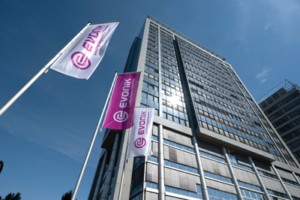Evonik makes some of world’s cleanest chemicals even greener
Hanau, Germany – Evonik’s Active Oxygens business line has released a new sustainability strategy aimed at expanding the beneficial handprint and reducing the environmental footprint of hydrogen peroxide, peracetic acid, and persulfates. The strategy includes concrete steps to slash carbon emissions and increase resource efficiency in the production of these chemicals, with the goal of achieving climate neutrality across the business line by 2040. Active Oxygens also aims to promote these chemistries as environmentally friendly alternatives in diverse growth industries.
Hydrogen peroxide, peracetic acid, and persulfates are powerful oxidants with a broad array of sector applications. Because they break down quickly into harmless substances — mostly just oxygen and water — they are considered some of the cleanest chemicals available. Yet upstream, conventionally producing these versatile substances leaves a carbon footprint.
“Global demand for hydrogen peroxide is rising by seven to eight percent every year, driven by growth fields such as chemical synthesis, environmental applications, nutrition, and electronics,” says Robert Katzer, head of Strategic Marketing for the Active Oxygens business line. “This makes it particularly urgent to reduce this product’s environmental footprint. Fortunately, the technology is there, and we have a step-by-step plan to meet this rising demand in a clean, green manner.”
One lever is through the use of renewables. By the end of 2021, over 80% of the electricity used at Active Oxygens’ production facilities worldwide was already being drawn from renewable sources. This share is intended to exceed 90% in 2023. According to the strategy, new solutions will also be implemented for heat pumps and efficient energy reuse over the next ten years. The business line aims to operate its first fully climate-neutral production facility by 2032.
In addition, Active Oxygens is pursuing ambitious plans to switch fossil-based raw materials in its production processes to, for example, bio-based acetic acid and green hydrogen. Green hydrogen is created through water electrolysis powered by renewable electricity. The business line is currently exploring options to locally source sustainable hydrogen at each of its sites around the globe. The first plant is scheduled to begin utilizing green hydrogen in 2026, with the rest following soon thereafter.
On the customer side, using hydrogen peroxide, peracetic acid, and persulfates can contribute to greener industrial processes. “As the population grows, global megatrends such as urbanization are bringing about massive changes,” explains Robert Katzer. “This is where our products can contribute to more sustainable solutions. For example, treating wastewater with hydrogen peroxide or peracetic acid results in far fewer residues in the environment than using other chemicals. It can save energy, too: Hydrogen peroxide can pre-treat industrial wastewater, oxidating non-biological contaminants that would otherwise need to be incinerated in an energy-intensive process. We are working together with customers across the world to implement and expand the use of these technologies.”
Resource efficiency is also in focus for a further important use for hydrogen peroxide: chemical synthesis. Conventional production of propylene oxide and propylene glycol, for example, can create unnecessary by-products. By using hydrogen peroxide for the direct synthesis of these in-demand products, Evonik Active Oxygens’ proprietary technology offers an innovative, sustainable, and efficient alternative.
As a business line within Evonik’s Smart Materials division, Active Oxygens’ sustainability goals particularly support the division’s “Eco Solutions” growth field. Eco Solutions are applications that save resources and enable environmentally friendly processes. Smart Materials aims to generate EUR 900 million in sales from Eco Solutions by 2027.
The new strategy also contributes to the Evonik group’s sustainability approach overall. This approach is based on ambitious targets and key activities to translate them into measurable actions. Sustainability forms an integral part of the strategy and commercial activities of Evonik and all of its business lines, with the company systematically focusing on the impact of its activities along the entire value chain, based on the U.N. Sustainable Development Goals. Evonik is one of the leading companies in the chemical industry for sustainability, backed up by the results of important independent rating and ranking agencies such as MSCI, Sustainalytics, EcoVadis, and CDP.

